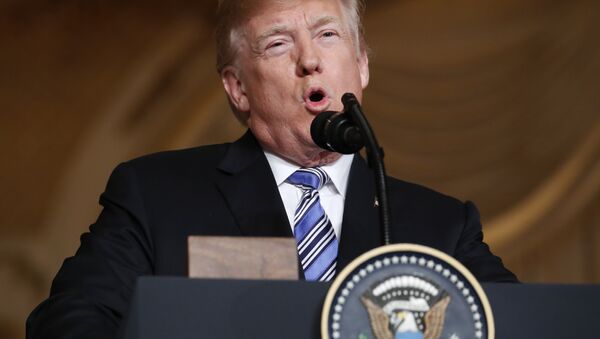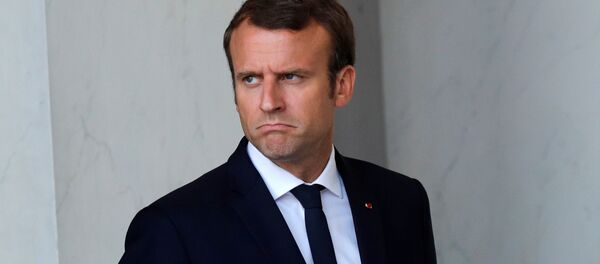"I am announcing today that the United States will withdraw from the Iran nuclear deal," Trump said, in a statement before reporters in the White House on Tuesday afternoon.
The president called the JCPOA a "horrible, one-sided deal that should have never, ever been made," and suggested that it was "defective at its core."
"If I allowed this deal to stand, there would be a nuclear arms race in the Middle East," Trump said.
Trump also said that the US and its allies would work to counter Iran, including its missile program, its nuclear ambitions, and its meddling across the Middle East. Calling Iran a "regime of great terror," the president alleged that the country was the world's leading state sponsor of terrorism.
Speaking to reporters, the president also said that his decision would "make America much safer." He suggested that a new deal could be negotiated sometime in the future which would lead to the "peace and stability we all want in the Middle East," pending Iranian willingness.
Responding to Trump's announcement, French President Emmanuel Macron said that France, Germany and the UK regret the decision. EU foreign policy chief Federica Mogherini referred to the agreement as a pillar of international security and call on its other signatories to continue to abide by it.
Commenting on the decision, Iranian President Hassan Rouhani said that the US has a history of undermining international treaties. Iranian state television called Trump's move "illegal," "illegitimate," and said that it undermines the US's international commitments.
Israeli Prime Minister Benjamin Netanyahu thanked Trump for his decision. Saudi state television has reported that Riyadh supports the move.
Senior Democratic Senator Dick Durbin called the withdrawal "a mistake of historic proportions."
New White House National Security Adviser John Bolton, a longtime Iran hawk, disagrees. He said in a Tuesday conference call on the issue that more sanctions should be pursued.
"I think it is entirely possible that additional sanctions will follow as new information comes to light," he said. "That's something we should pursue vigorously because we want to put as much economic pressure on Iran as we can to deny them the revenues they would have gotten from the transactions we're now limiting."
European Allies Fail to Stop US Withdrawal
The leaders of France and Germany made high-profile visits to Washington recently to try to convince the president not to back out of the deal. Former members of the Obama administration have urged him to do the same. Russian and Chinese officials have also warned about the dangers of scrapping the agreement. Israel has taken the opposite approach, encouraging Trump to quit the JCPOA. Last week, Prime Minister Benjamin Netanyahu made a public presentation in which he declared that Iran's nuclear program had a secret military component which Tehran did not disclose.
Inspections by the International Atomic Energy Agency, the foremost authority on the matter, have repeatedly affirmed that Iran is in full compliance of the JCPOA. The agency has insisted that Iran "is subject to the world's most robust nuclear verification regime."
The JCPOA was signed by Iran on the one hand and the United States, Russia, China, the United Kingdom and France, Germany and the European Union on the other in Vienna on July 14, 2015 after two years of difficult negotiations. The deal promised Iran sanctions relief in exchange for a commitment not to engage in the development of a military nuclear program.




